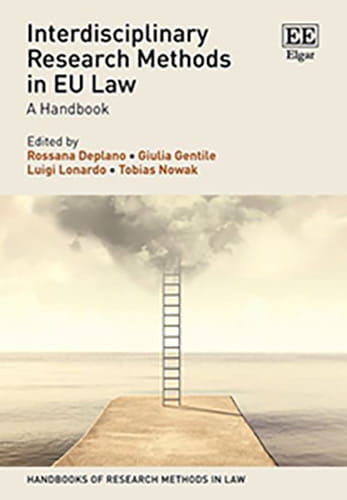Dr Giulia Gentile, Lecturer in Law at Essex Law School, has co-authored (with Monika Glavina and Tobias Nowak) the Open Access chapter The application of EU law from the national judge’s perspective: a plea for an interdisciplinary approach in Interdisciplinary Research Methods in EU Law, a major new handbook which she also co-edited.
Dr Gentile recently told us more about her work and her thoughts on Open Access, and the chapter is freely available to download now.

Congratulations on the publication of your new chapter! Are you happy with the result?
I am delighted with the result. I am grateful to my chapter’s co-authors, Dr Monika Glavina and Dr Tobias Nowak, the co-editors and all the contributors of the Handbook for a very stimulating and enriching editorial process.
You chose to make use of the University’s Open Access Fund. Why is Open Access important to you and how do you think it will benefit your work?
Open Access is crucial for researchers, students and the general public. It ensures that academic research can be widely read, thus advancing the knowledge of the academic community and the wider public. Open Access also supports research impact and fosters debate and exchange of ideas. In a perfect world, all research would be Open Access.
How did you find the Open Access process?
The process is easy and straightforward. I have highly benefitted from the support of the Essex Open Access Team, to whom I am very grateful.
What advice about Open Access, or publishing in general, would you offer to colleagues?
My advice would be to explore with your department and institution Open Access policies and support as soon as a piece is published. Open Access would expand the reach and impact of your published research.
Now, about your chapter and the volume itself, which appears in the highly regarded Handbooks of Research Methods in Law series. Please give us a quick overview.
The chapter brings novelty and continuity to EU law research as well as my research trajectory.
The chapter is novel because of its systematising and rationalising aspiration. It critically reflects on the methodologies to study the application of EU law under the perspective of the individual judge. EU lawyers and scholars tend to focus on big cases and the systemic application of EU law, thus disregarding the crucial role of individual judges in applying EU law. The perspective and knowledge of the individual judge on EU law could determine the extent of application of that law. To unearth this perspective, interdisciplinary research methods are of the essence. The chapter offers a guide to scholars, researchers and students to identify the most appropriate methods for their research questions.
This chapter also builds on my previous work on the enforcement of EU law in the Member States and its effects on individuals on the one hand, and interdisciplinary research methods on the other hand.
How long has it been from initial idea to publication of the collected volume?
My co-editor and I have started working on the Handbook during the pandemic in 2021, and organised a workshop with all the contributors in September 2022 to discuss the chapters. It has been a long yet rewarding editorial journey through knowledge!
Who do you think will most benefit from your chapter?
Researchers interested in EU law and interdisciplinary methods, but also students exploring the empirical dimension of EU law, and members of institutions keen to articulate interdisciplinary solutions to EU law problems.
What’s next for you? Do you have plans for any new projects?
I am currently working on a project supported by the Horizon Grant ‘EXPRESS2’ to reconceptualise the EU social contract in the age of AI. For this project, my background in interdisciplinary research methods and EU law has been of great help.
Namely, I am exploring the following questions: how is AI transforming the relationship between individuals and the EU constitutional order? How have digital technologies impacted the EU social contract? Exploring these issues will help reconceptualise the role of digital technologies in society and especially in the EU constitutional architecture. These are exciting times to be working on EU law and digital regulation!
The application of EU law from the national judge’s perspective: a plea for an interdisciplinary approach, from Interdisciplinary Research Methods in EU Law (Edward Elgar, 2024) is available to download now.
The Open Access Fund
The University of Essex’s institutional Open Access Fund enables Essex authors to publish their research Open Access and to share their findings without barriers. You can explore your Open Access options with our dedicated forms: for books and chapters and for journal articles.







